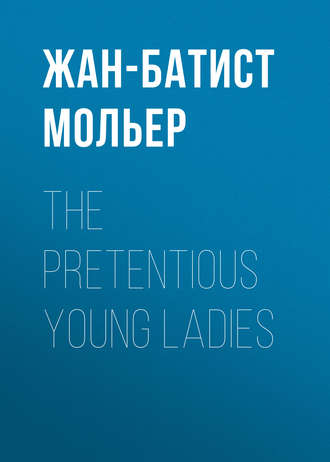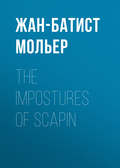
Мольер (Жан-Батист Поклен)
The Pretentious Young Ladies
And now he knows there are inough i' the Town
At name of mirth and Comedy will frown,
And sighing say, the times are bad; what then?
Will their being sad and heavy better them?"
[Footnote: In 1665 the plague broke out in London, and in the succeeding year the great fire took place; only at Christmas 1666 theatrical performances began again.]
According to the list of "The Representers, as they were first design'd." I see that Nell Gwyn should have played the part of "Lysette, the Damoiselle's waiting Woman."
James Miller, a well-known dramatist, and joint-translator of Molière, with H. Baker, has also imitated part of "the Pretentious Young Ladies," and with another part borrowed from Molière's School for Husbands, two characters taken from Molière's Learned Ladies, and some short speeches borrowed from the Countess of Escarbagnas, he composed a comedy, which was played at Drury Lane, March 6th, 1735, under the title of The Man of Taste, or, The Guardians. Mr. Miller appears to have been a man of indomitable spirit and industry. Being a clergyman, with a very small stipend, he wrote plays to improve his circumstances, but offended both his bishop and the public. At last he was presented to the very valuable living of Upcerne, in Dorsetshire, and was also successful with a translation of Mahomet of Voltaire, but died within the year after his induction. The Man of Taste was printed for J. Watts, MDCCXXXV., and is dedicated to Lord Weymouth. We give part of the dedication:
"As to the Attempt here made to expose the several Vices and Follies that at present flourish in Vogue, I hope your Lordship will think it confined within the bounds of a modest and wholesome Chastisement. That it is a very seasonable one, I believe, every Person will acknowledge. When what is set up for the Standard of Taste, is but just the Reverse of Truth and Common Sense; and that which is dignify'd with the Name of Politeness, is deficient in nothing – but Decency and Good Manners: When all Distinctions of Station and Fortune are broke in upon, so that a Peer and a Mechanick are cloathed in the same Habits, and indulge in the same Diversions and Luxuries: When Husbands are ruin'd, Children robb'd, and Tradesmen starv'd, in order to give Estates to a French Harlequin, and Italian Eunuch, for a Shrug or a Song; [Footnote: Farinelli, an eminent Italian soprano, went to England in 1734, remained there three years, sang chiefly at the Theatre of Lincoln's-Inn-Fields, then under the direction of Porpora, his old Master, became a great favorite, and made about, £5,000 a year. As The Man of Taste was performed at a rival house, Drury Lane, the bitterness of the allusion may be easily understood. The French Comedians acted at the Haymarket from November 22, 1734 to June 1735, hence the allusion to a French Harlequin.] shall not fair and fearless Satire oppose this Outrage upon all Reason and Discretion. Yes, My Lord, resentment can never better be shown, nor Indignation more laudably exerted than on such an occasion."
The Prologue, spoken by Mr. Cibber, is racy. We give the first half of it: —
"Wit springs so slow in our bleak Northern Soil,
It scarce, at best, rewards the Planter's Toil.
But now, when all the Sun-shine, and the Rain,
Are turn'd to cultivate a Foreign grain;
When, what should cherish, preys upon the Tree,
What generous Fruit can you expect to see?
Our Bard, to strike the Humour of the Times,
Imports these Scenes from kindlier Southern Climes;
Secure his Pains will with Applause be crown'd,
If you're as fond of Foreign sense as … sound:
And since their Follies have been bought so dear,
We hope their Wit a moderate Price may bear.
Terence, Great Master! who, with wond'rous Art,
Explor'd the deepest Secrets of the Heart;
That best Old Judge of Manners and of Men,
First grac'd this Tale with his immortal Pen.
Molière, the Classick of the Gallick Stage,
First dar'd to modernize the Sacred Page;
Skilful, the one thing wanting to supply,
Humour, that Soul of Comic Poesy.
The Roman Fools were drawn so high … the Pit
Might take 'em now for Modern Men of Wit.
But Molière painted with a bolder Hand,
And mark'd his Oafs with the Fool's-Cap and Band:
To ev'ry Vice he tagged the just Reproach,
Shew'd Worth on Foot, and Rascals in a Coach."
[Footnote: The plot of The Man of Taste, as we have said before, was partly borrowed from Molière's School for Husbands, partly from the Pretentious Young Ladies, and other of his plays. The first-mentioned French comedy owes part of its plot to Terence's Adelphi, hence the allusion to "his immortal Pen." in the above poem.]
Mrs. Aphra Behn, a voluminous writer of plays, novels, poems, and letters, all of a lively and amorous turn, was the widow of a Dutch merchant, and partly occupied the time not engaged in literary pursuits in political or gallant intrigues. Her comedies are her best works, and although some of her scenes are often indecent, and not a few of her expressions indelicate, yet her plots are always lively and well sustained and her dialogues very witty. The date of her birth is unknown, but she died on the 16th of April, 1689, and was buried in the cloisters of Westminster Abbey.
In 1682, was performed, at the Theatre, Dorset Garden, her play. The False Count, or a New Way to Play an Old Game. The prologue attacks the Whigs most furiously, and the epilogue, spoken by Mrs. Barry, is very indecent. The plot of this play, or rather farce, is very improbable, and the language is more than free. Julia, in love with Don Carlos, afterwards Governor of Cadiz, was forced by her father to marry Francisco, a rich old man, formerly a leather-seller; the latter going with his family to sea on a party of pleasure, are taken prisoners by Carlos and his servants, disguised as Turks. They are carried to a country house, and made to believe they are in the Grand Turk's seraglio. There is also an underplot, in which Isabella, Francisco's proud and vain daughter, is courted by Guilion, a supposed Count, but in reality a chimney-sweep, whose hand she accepts. In the end everything is discovered, and Guilion comes to claim his wife in his sooty clothes.
Thomas Shadwell, a dramatist, and the poet-laureate of William III., who has been flagellated by Dryden in his MacFlecknoe and in the second part of Absalom and Achitophel, and been mentioned with contempt by Pope in his Dunciad, took from the Précieuses Ridicules Mascarille and Jodelet, and freely imitated and united them in the character of La Roch, a sham Count, in his Bury-Fair, acted by His Majesty's servants in 1689. This play, dedicated to Charles, Earl of Dorset and Middlesex, was written "during eight months' painful sickness." In the Prologue Shadwell states:
That every Part is Fiction in his Play;
Particular Reflections there are none;
Our Poet knows not one in all your Town.
If any has so very little Wit,
To think a Fop's Dress can his Person fit,
E'en let him take it, and make much of it.
Whilst, in The Pretentious Young Ladies, Mascarille and Jodelet impose upon two provincial girls, in Bury-Fair, La Roch, "a French peruke-maker" succeeds in deceiving Mrs. Fantast and Mrs. Gertrude under the name of Count de Cheveux. The Count is very amusing, and though a coward to boot, pretends to be a great warrior. His description of war is characteristic; he states that "de great Heros always burne and kille de Man, Woman, and Shilde for deir Glory."
DRAMATIS PERSONAE
LA GRANGE, \) repulsed Lovers. DU CROISY, /
GORGIBUS, a good citizen.
[Footnote: Gorgibus was the name of certain characters in old comedies.
The actor, L'Epy, who played this part, had a very loud voice; hence
Molière gave him probably this name.]
THE MARQUIS DE MASCARILLE, valet to La Grange.
[Footnote: Mascarille was played by Molière, and has a personality quite distinct from the servant of the same name in the Blunderer and the Love-Tiff. The dress in which he acted this part, has not been mentioned in the inventory taken after his death, but in a pamphlet, published in 1660, he is described as wearing an enormous wig, a very small hat, a ruff like a morning gown, rolls in which children could play hide-and-seek, tassels like cornucopise, ribbons that covered his shoes, with heels half a foot in height.]
THE VISCOUNT JODELET, valet to Du Croisy.
ALMANZOR, footman to the pretentious ladies.
TWO CHAIRMEN
MUSICIANS
MADELON, daughter to Gorgibus, \) The pretentious young ladies. CATHOS, niece to Gorgibus, /
MAROTTE, maid to the pretentious young ladies.
LUCILE. \) two female neighbours. CÉLIMÈNE. /







